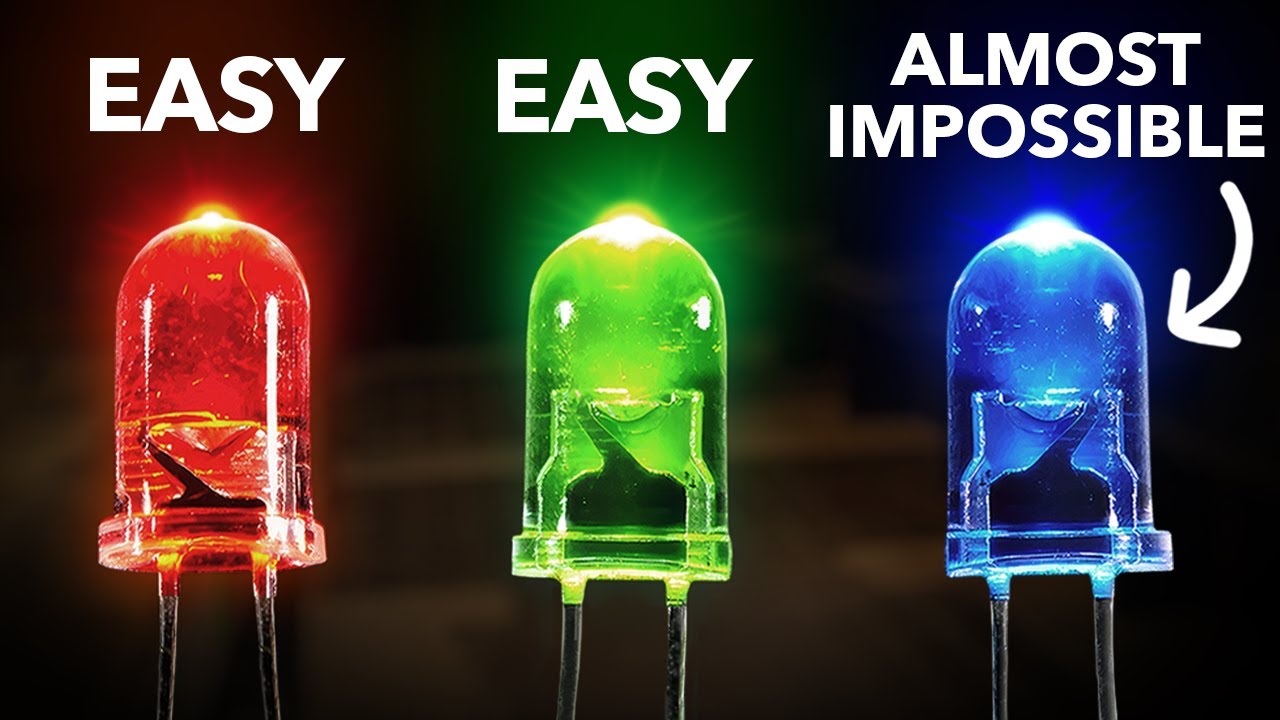The blue LED was supposed to be impossible—until a young engineer proposed a moonshot idea.
Really annoying that the company shat on him for years, and continued to do so after he multiplied the value of the company. Toxic behavior.
It’s an extreme example that perfectly illustrates how profit is extracted from employees by the employers. He didn’t have any leverage to get a larger share of the profit from his labor, as is the case with most employees. You could call it toxic behavior, and it is, but it’s the expected behavior, the behavior incentivised by the system.
It also shows how capitalism hinder innovation. It doesn’t create it. The potentially innovative path took money without any guarantee of creating profit. It’s bad business to be innovative. Capitalism prioritizing profit never chooses the best path, even if it gets a good ending eventually despite itself.
It’s a capitalist company that funded him to go to Florida and bought him the machine to do his work.
Where do you think he would get the 3 million the company gave him? It’s the company that spent that money to bet on innovation and they got a return on investment
Capitalism never chooses the best path, but neither does any other system. We haven’t invented a perfect system, and it’s probably impossible. Sounds like a strange critique since we’ll never reach perfection
And then capitalism that made the company repeatedly ask for him to stop researching it.
It’s the opinion of one person at the company. Under socialism there are also people who decide which research deserves funding.
Where do you think he would get the 3 million the company gave him?
As the story describes, it was the founder who was acting emotionally that funded him. It was no different than a noble patronage of someone like DaVinci in medieval times. When the capitalist son in law took over, he was cut off. It was only Japanese culture from Japan’s pre-capitalist era that saved his job.
The founder was acting in the company’s interest, that’s why you fund research.
He was actually not cut off either, he wasn’t fired when he continued his research despite being told not to. He still received a salary and was able to use the equipment purchased with company funds
You’re right that nothing is perfect. How does that make critique invalid though?
Capitalism prioritizes profit. That’s it. We can imagine systems that prioritize any number of things; public welfare, innovation, creativity, equality, etc. Nothing will be perfect, but I’d say any goal is better than the selfish goal of profit seeking. Do you disagree?
Yeah where he went to a university not a capitalist company to learn. Then persisted in his research despite the capitalist company wanting to shut him down for not being profitable, then that company specifically and consciously screwed him over and didn’t reward him for it. Then tries to screw him over once again when he got a different job because of it.
Who funded him to go? It’s not like he paid for the trip out of his pocket
The company could have also just fired him for not listening to orders. But I agree that they didn’t compensate him enough
The CEO of the time who actively went against the conventional wisdom of capitalism to fund a person he had know for decades and personally knew how capable he was.
Then as soon as that CEO left the personal connection was gone and typical capitalist mentality took over and tried to shut it down
Just like almost every big discovery this happened in spite of capitalism, not because of it.
That could happen in socialism, where a government grant runs out and research is no longer funded because the person in charge of funding science changes.
I’m not sure how you come to this conclusion. For every example of a capitalist avoiding risky investments, there are 100 capitalists betting on the next innovation.
Venture capital. Heard the term? AI, Metaverse, crypto, web 2.0, .com… The tech space alone is full of capital making (stupidly risky) bets. They also make good bets too, like PC, search engines, online shopping (oh, look how the tech giants came to be).
I get it, capitalism bad. But this is just a nonsensical argument.
I was working for a place that was the market leader in a certain niche of simulation software. Their simulation was about 10x more efficient than their competitors. However, that version of the software is strictly off limits for the public, and made a version which they sold with a sleep statement so that it was only 1.1x faster than the next best solution. That way they could remain market leaders any time the competitors released a better version. Even though many systems rely on growing simulations to simulate bigger scenarios that could help save lives.
Just an example of capitalism impeding progress.
Open source software solves that kind of hidden bullshit.
Exactly why I left that company.
Specifically free (libre) licences, as permissive licences allow corporations to improve/adapt the software without contributing back to the community.
I only work on software with GPL compatible licences now.
And open source software is explicitly anti-capitalist.
Yeah metaverse and crypto are such innovate projects that will really change the world and not just more the same bullshit cash grabs.
Really undermining your own argument.
You completely missed the point there, damn. He’s saying those things are very likely to be bad investments.
No I get the point. But showing they make make stupid decisions doesn’t prove capitalism drives innovation, because those ideas aren’t innovative.
Innovative ideas are rarely smart ideas.
Sure, it happens sometimes. However, the goal is never innovation for the sake if innovation. It’s innovations to create profit. The idea is you invest into one of these ideas that then creates a monopoly that can practice anti-completive behaviors to create more profit.
For example of something better, look at research universities. They are normally outside of capitalism and create innovation primarily for the goal of advancing knowledge of a subject or to solve some issue. It’s rarely purely for profit to sit on the thing after it’s created and ensure no one else can use it.
This is something that’s often poorly understood. There’s no profit in a perfectly competitive market. That is, according to orthodox economic theory, the most efficient market conditions are the ones where no participants make profit. From that you can derive what you said - that innovation is sought for moving a business away from perfect competition by gaining competitive advantage, which is anticompetitive! 😆
The ratio might not be 1:100. It might not even be tilted towards the risk takers. Also some if not most of the examples you mentioned are based research done in universities and defence agencies. That research is typically a much riskier endeavor. That’s why the private sector doesn’t even attempt it and only shows up to productize or build upon that research once the risk for not turning profit is minimized.
Makes me presume power harassment.
On the flip side, he was using up millions and millions of company dollars on his singleminded pursuit with no obvious results to show for it. Had things gone even a little differently, things would’ve gone very differently indeed. Hard to imagine most companies tolerating an employee flat ignoring instruction to change to another task when their old task was proving fruitless.
Hindsight is clear enough here, but in context it was pretty nuts what the guy was doing.
Makes you wonder how many great inventors of revolutionary tech were shoved off their path by dumb luck.
Probably far fewer than never had the opportunity to realize they could be great in the first place.
If greatness is one in a billion we have 8 (boy would the richest like us to believe that!). If it’s one in 100 million (I’m bad at math. I think it’s like) 80. Or if it’s one in a million, that’s 350 in the US alone. I’m inclined to lean toward the later, after all, if there aren’t a lot of greats waiting to be called up, how the fuck did we beat the odds by such a large margin??
deleted by creator
Didn’t fire him though. I don’t think my boss would let me sit in an office doing my own project and binning notes from him for 20 years.
I bet he was ok with : Nobel prize bitch!
That’s Japan, baybee. They love their toxic work culture. Thankfully, it is slowly changing with the younger generations, however.
The blue led was released in 1993. I remember reading an article in Wired magazine (back when magazines were published on paper) about the invention. Gladly, the article is still available online: https://www.wired.com/1995/03/blue-laser/
I talked with some friends about the “true boo-roo” led, and the phrase stuck with us (that’s why I still remember the article). At the time (almost 30 years ago) we had no idea how important the invention was, even when we realized that it allowed for rgb led light.
But we had no idea leds would be miniaturized to be used in screens and be as ubiquitous as they are today. Living through all this technology evolution has been quite the ride.
That was a great read, thanks. It made me realise I don’t even remember the last time I changed a light bulb!
I wish I could say the same. I have had one of two that had circuits that burned out. One was cheap and not surprising. The other was a Hue. Speaking of Hues, mine all seemed to stop working with Google Home and one even decided it would permanently be disco time and continually flashes. Zigbee compatible bulbs only from now on for me.
Aren’t all Hue bulbs Zigbee? They have some WiFi or bluetooth models now I believe but afaik all of them support Zigbee with a bridge.
There was encryption for a while, iirc. This was removed, and you can now communicate directly with Hue bulbs.
You can also use bluetooth for hub-free operation directly from a phone.
The leds can work for like 20 years. On the other hand the rest of the components are not necessarily going to last that long unfortunately.
I’ve changed my fair share of LED bulbs. Nowhere near the frequency of incandescent though.
Wow, thank you for sharing that.
Excellent counter example to anyone claiming that we need patent and copyright to innovate.
This man made nothing on his invention and was not motivated by money but fame.
There are endless of examples of how those who do things for money hold back the creativity that leads to innovation. This is one of them. It almost didn’t happen because his pursuit was not seen as profitable.
Sure, but the company fronted the millions of dollars required to develop the technology. The investment needs to come from somewhere.
That doesn’t have to be a private company, though. We need public funding that retains the patent rights, if not just to make the invention free from licensing costs to manufacture.
The insane thing about our current system is that we do have public funding, but private companies wind up with the patent anyway
The company didn’t invent it. A person did. The company almost stopped it from being invented. They didn’t spend millions inventing this. A person spent tens of thousands of hours inventing it.
That the funding is only available from a company is a result of the patent system. It does not spur development, it perverts it. Any ideas to the contrary are propaganda.
People have been inventing shit longer than corporations have existed. People have been inventing things without any guarantee on return on investment for most of human history.
Capitalism is bullshit and the capitalization of ideas harms humanity.
deleted by creator
Correct. With or with patents and with or without copyright, it eventually would have been invented.
Edit: Curious if you watched the full video. It clearly indicates that all corporate efforts were heading in an opposite direction and that the path this inventor took was considered to be not profitable and not worth the investment by everyone else working on this. The company he worked for wanted to shut down his research and focus on following the herd. No one else was close to his level of progress and capitalist interests almost scuttled this invention.
deleted by creator
I mean, the video even showed that there WERE notable people other than him travelling down the same path, his first few leaps were copied off them, he just figured out the last few himself
Yeah it’s pretty bad and nobody talks about it. Nobody researches the effects of patents on our global civilization. I suspect the practical role of patents is to actually retard innovation - something gets improved or invented or most of the time just engineered to work better and monopolization or just paperwork makes it too expensive for wide spread adoption. This in turn helps prevents disruptive technology from making large scale investments obsolete - instead of having to adopt and improve your factories you can continue as before because any innovation will be slow and also priced to be around as expensive as existing solutions. Or the patent can just be bought. And even if an inventor has noble intentions, starting manufacturing yourself is a totally different skill set so like most startups often fails and then the patent gets sold off. Innovation becomes a commodity.
This is my logical conclusion but it’s speculative. I suspect researching negative effects of patents is a somewhat “taboo” topic for scientists to research.
In regards to climate change this becomes… genocidal. We have hundreds of thousands of industrial processes that rely on fossil fuels or certain levels of energy. With all the before mentioned effects this basically made a timely response to climate change impossible. Every little improvement to existing processes is patented and maximized for profit. Basically we never had a chance.
This man made nothing on his invention and was not motivated by money but fame.
And then he sued the company for $20 million because the CEO didn’t want to respect his efforts and stiffed him.
And the amount he actually won only covered the legal fees, so he made nothing.
And if he had been granted a patent for his invention, he would have been fairly compensated for his work by being able to license production to companies that had the means to make them at scale. OP seems to think this scenario is an example of how patents should be abolished, but it’s a perfect example of why we have them in the first place. And that reason is so that rich people don’t fuck over comparatively poor inventors.
Your cognitive dissonance is why we cannot improve this system. Patents cannot both be responsible for his lack of profit from his invention and how he would have been fairly compensated.
Patents do exists and we was not fairly compensated, therefore patent do not solve their intended problem.
We live in this reality. Not whatever rose colored version you think could exist if we just get the correct tweaks in place.
At some point we need to stop trying to adapt the concepts people came up with hundreds of years ago. Created in a world that no longer resembles our own.
Consider how contentious the issue was that they redefined to included it in the constitution. The consider what other contentious issues were also included in that same document, i.e. the three fifths compromise.
Parents do exists
Phew, was scared there for a second.
My favorite thing about widely-available blue LEDs was the effect on TV scifi.
Watch the Star Trek shows made in the 1980s and 1990s and the tricorders, alien gadgets, and other props were always twinkling with red, yellow, and green LEDs to look futuristic. A generation later and every single hand prop on 2000s Doctor Who, Torchwood, etc. glowed and twinkled blue because the LEDs had just become cheap enough for prop makers, but weren’t yet widespread in day-to-day life so the viewers were seeing something strange and unusual.
Now every color of LED imaginable is just common and whatever, but for a good stretch of time glowy blue became the standard “scifi” color just because that particular tech happened to turn up at that particular time.
Purple still seems to be a tough one for most rgb devices I’ve used lol
They’re still rgb plus maybe yw using colour mixing, so depending on the quality, tuning, physics and our perceptionof light, not all colours are as nice or bright.
Yeah. I just think being RgB it would be good at purple 😂 One of those situations where the name was probably not created based on logic lol
It’s called RGB because there’s a red, green, and blue diode. Not sure how that’s not a logical name.
Oh I was making a joke cause it sucks at purple. Which is red and blue combined generally. But that’s not really how the RGB color cycle works as far as I understand in some extremely cursory Wikipedia reading lol
IIRC, it has something to do with the fact that purple sort of doesn’t actually exist. As I understand, purple is basically your brain going “idk wtf it is but it’s not green”
lol my favorite color would be a weird one. 😂
9’s sonic screwdriver
I’m not sure that LEDs were the thing that kicked off the trend. They made it easier to implement, but even in the 80s and 90s, you had things like Tron that might have kicked off the futuristic look with neon lines/tubes.
Making blue LEDs is easy. Just make a red one, then move towards it really fast.
Doppler effect?
https://en.m.wikipedia.org/wiki/Redshift#Blueshift
Essentially yes
Yeah but it only works if the source is moving towards the observer
It seems that the blue led is picked by many manufacturers now for its coolness factor. There are so many appliances people have in sleeping areas with blue lights glaring and disturbing sleep
I carry a bit of gaffer’s tape everywhere for those little obnoxious blue bastards.
It’s such a big problem that there’s literally LED dimming tape on the market. It’s semi-transparent tape that you stick over the blue LEDs, to knock them down to a more reasonable brightness. It’s akin to putting sunglasses on your appliances.
I just layer on masking tape until it’s dim enough, usually 2 layers
The last like 3 computer cases have had blue power leds. They often are brighter than night lights. I have gotten to the point where I only connect the power button as the leds are so bright and the number of times I’ve inadvertently hit the reset button.
I made a hobby PCB with indicator LEDs and I have to admit that was the reason for my choice. The surface mount frosted “milky” ones look especially great, where they have the diffusion layer so it’s not a harsh glare.
This was an yet another glorious episode from veritasium.
I hope we get well past UVC LEDs. (i.e., shorter wavelengths) UV LEDs are already available. Unfortunately, this progress will stop before X-ray light. With +1 KeV energy, you pretty much must blast off the electrons from the atoms to emit X-rays, which an x-ray tube already does. Or by peeling off a piece of scotch tape.
Maybe making X-ray emitters cheap enough to put in a flashlight isn’t the best idea anyway.
Maybe not in a flashlight, but the scientific industry would be very pleased with them. Sterilize water and all surfaces in a second? Flash with 200nm light.
Handheld battery powered X-ray devices exist and are widely available. I used to work with those. In Germany you need a permit to operate them. https://www.thermofisher.com/order/catalog/product/de/en/XL2
What’s wrong with the current UV tubes? Sure, the smaller ones take about 5-10 W to get the job done, so maybe an LED version would be more efficient. If you’re using UV to keep a massive pool clean, then you’re obviously going to be need more of those bulbs, and they can add up to hundreds of watts quite easily. Is that really a big problem though? Having a pool isn’t cheap, so electricity spent on UV probably isn’t going to be your main concern. Making it cheaper is always welcome, but are UV tubes really that big of a problem?
I mean they aren’t instant and have to be within a fairly short distance of the thing you want to sterilize in order to work because they are absorbed by the air. Something like a pool would be practically impossible as water also absorbs UV and a pool is too big to penetrate all the way through just from the sides or bottom. It only works for drinking water because you pass said water through a tube that must be fairly narrow.
Oh yeah and an X-ray could sterilize all the way through an object, not just the surface. Very useful for making things like microwave meals.
How about cheap enough to put in a fleshlight?
If you have a bone in your penis, you may not be fully human.
Otherwise, don’t x-ray your penis.
X-rays use invisible electromagnetic energy beams to produce images of internal tissues, bones, and organs on film or digital media.
Good advice, but I put a Kleenex in my urethra for safekeeping and I’d love to track it down to get it out again.
Amateur. It’s in the scrotum along with all the pee.
Next time you have to fart just squeeze your butt cheeks together real hard. It’ll pop right out.
The fart?
You tell me. Your user name suggests some expertise.
/c/flashlight sends its regards
deleted by creator
Sorry sir I have no idea what you are talking about
More efficient compact X-ray generators would be pretty huge for science work. We run the diffractometer in my lab at 2 kW and it still takes hours to get a good quality scan
Get past uvc for what purpose?
I imagine that lithography for integrated circuits would be an application, assuming you could make an appropriate photo-resist. The shorter the wavelength, the smaller the possible feature size. Current lithography relies on constructive and destructive interference between wavelengths to create super small features.
As far as “light” it’s already capped out, then. Going shorter there’s only x-ray and then Gamma ray. Gamma ray lithography sounds bad-ass and dangerous.
Gamma rays have so much energy that they are basically emitted only by nuclear processes, as far as I know.
Until we stick it in an led!
I guess past the uv range we should just call them ED, but then you only think about erectile dysfunction.
A few details as further info, focusing mostly on the technical aspects:
It’s considerably easier to decrease the band gap than to increase it. Decreasing it only requires that you insert some material to provide an intermediate band, while increasing it would likely need alloying it to force some structural change.
The material being in the right band gap is not enough. You need to make sure that it can be p-doped and n-doped, that its crystalline structure is stable even with some temperature variation. Ah, it should be also relatively straightforward to produce industrially.
Then you get the little gem that Nakamura found.
Haven’t watch the video yet, but I remember how impressed my step dad was with the blue LED when we got our PlayStation 2. I was like, yeah great whatever let’s play games, at the time.
I love Veritasium’s deep dives into the scientists behind various inventions. We really ought to celebrate more people like Nakamura.
Capitalism is just sad
That was an excellent watch, thanks for sharing.
YouTube is horrendous for ads though.
Revanced
I aint downloading a two year old microg gmscore apk 💀
You thinking of Vanced? Revanced is updated pretty regularly
No when I patch youtube, it wants me to download this 2 year old gmscore build:
Ah gotcha
That’s required for the non-root installation to login to YouTube, yeah. If you are rooted you can modify the patch list and remove microg.
Samsung (etc) caught with their pants down
It makes you wonder how much longer it would take to commercialize blue LEDs without his contributions.
I took a blue sharpie on my white LED - voilà
Your white led is a blue led with a phosphorescent coating.

Well no, but…yeah sure why not haha
Edit: Read the comment I replied to completely backwards nvm, am dumb lol
I freaking hate blue LEDs.
I actively avoid buying anything with a blue LED because they are so obnoxious. So bright. Why do I want to read by the light of my HDD? Does this video explain why they have to be like that?
Maybe if you have a separate wing of the mansion to do computing stuff it is not annoying. But if like a lot of people you have electronics in your living space, these lights are extremely disruptive.
It seems that can’t really be dimmed… I had to give up on a couple of blue backlit alarm clocks because there is no way that the time can be visible without illuminating the whole area around them.
For whatever reason, red is the best one. I would prefer another color aesthetically. For whatever reason, red is the only color that does what it has to do and nothing more.

If you own anything with “white” LEDs, I have some bad news for you…
deleted by creator
Luckily my device screens can all be turned off, closed, put face down and otherwise turned off when not in use. Unlike indicator lights on the routers, APs, HDDs, PCs, mice, powerbars, extension cords, radios, headphones, USB cables, ACs, microwaves etc etc etc. Either totally unnecessary to have a light in the first place, or a subtle light could do the job just as well.
This is actually a biological phenomenon that most humans experience! Our eyes are more attuned to greens and blues rather than reds, so green and blue light appear brighter as the cones in our eyes are more sensitive to those colors. Similarly, our cones are less sensitive to red so it appears darker.
There’s also a physics component to this as well since red light has about half the energy (twice the wavelength) as blue light. However, since there’s a difference in energy, the engineer must take that into account when designing multicolor LED applications so as to keep a level light intensity when changing or blending colors.
Here’s an eli5 question with some more info: https://www.reddit.com/r/explainlikeimfive/comments/ghx9g6/eli5_why_does_red_light_seem_darker/?rdt=58820
I’m the guy that takes an awl and literally shatters them, or I will just place tape over top if they are recessed too far.
Front facing LEDs are a menace.


























